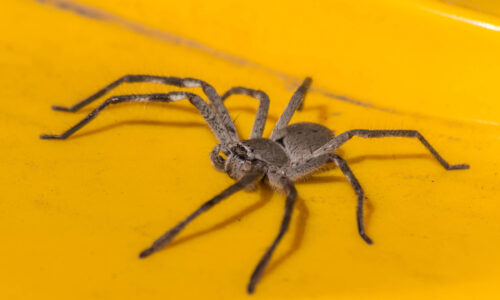Huntsman spiders are one of the most recognisable and misunderstood creatures in Australia. Known for their impressive size and lightning-fast speed, many people wonder: Are huntsman spiders dangerous? Let’s clear up the common myths and share everything you need to know about these fascinating arachnids.
Do Huntsman Spiders Bite?
Yes, huntsman spiders can bite — but bites are rare and usually happen only when the spider feels threatened. Most huntsman spiders prefer to flee rather than bite. Their fangs are capable of piercing human skin, but bites typically cause only mild symptoms like slight pain, redness, and swelling.
Severe allergic reactions are extremely rare, but if symptoms worsen after a bite, it’s important to seek medical attention.
Understanding Huntsman Spider Venom
While huntsman spider venom does exist, it is not considered dangerous to humans. Their venom is designed to immobilise prey such as insects and small animals. Unlike the venom of more notorious Australian spiders like the funnel-web or redback spider, huntsman venom is relatively mild and not medically significant for healthy individuals.
Key facts about huntsman spider venom:
- Non-lethal to humans
- Causes minor localised effects (pain, swelling)
- Severe reactions are extremely rare
Common Misconceptions About Huntsman Spiders
There are plenty of myths about huntsman spiders. Let’s address a few:
- Myth: Huntsman spiders are aggressive.
Fact: They are shy and prefer escaping over confrontation. - Myth: Huntsman spiders are deadly.
Fact: Huntsman bites are rarely serious and are far less dangerous than bites from other Australian spiders. - Myth: Huntsman spiders hunt humans.
Fact: Their rapid movements can startle people, but they are not hunting or attacking.
In truth, huntsman spiders play an important role in controlling pests like cockroaches and flies.

When Are Huntsman Spiders Most Active?
In Australia, huntsman spiders are more active during the warmer months, especially late spring and summer. The increase in heat and insect activity encourages huntsmen to move around more, sometimes entering homes in search of food or shelter.
Homeowners may notice more huntsman sightings:
- During summer storms (seeking dry shelter)
- At night (when they are most active)
- Near lights that attract insects
How to Manage Huntsman Spiders in Your Home
While huntsman spiders are generally harmless, you may still prefer to keep them outdoors. Here’s how to minimise encounters:
- Seal cracks and gaps around doors and windows.
- Remove clutter that provides hiding places.
- Use flyscreens on windows and doors.
- Relocate spiders safely by gently trapping and releasing them outside.
If you have frequent spider issues, it may be worth contacting a professional spider control service like Flick for advice and treatment.
Final Thoughts: Are Huntsman Spiders Dangerous?
In short — huntsman spiders are not dangerous to humans. They might give you a fright, but they are generally harmless and beneficial for keeping other pests under control. With a better understanding of their behaviour, you can appreciate these impressive arachnids without fear.
If spider sightings are becoming a nuisance around your home, or you simply want peace of mind, contact Flick for professional spider control tailored to your needs.
Enjoyed this article?
If you found this article helpful, sign up for our free Quarterly Newsletter to receive all our tips and tricks on pest control and washroom hygiene.
Sign Me Up!